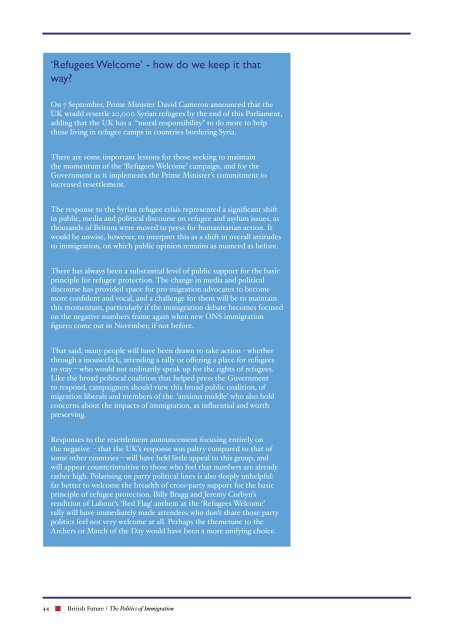THE POLITICS OF IMMIGRATION
The-politics-of-immigration
The-politics-of-immigration
Create successful ePaper yourself
Turn your PDF publications into a flip-book with our unique Google optimized e-Paper software.
‘Refugees Welcome’ - how do we keep it that<br />
way?<br />
On 7 September, Prime Minister David Cameron announced that the<br />
UK would resettle 20,000 Syrian refugees by the end of this Parliament,<br />
adding that the UK has a “moral responsibility” to do more to help<br />
those living in refugee camps in countries bordering Syria.<br />
There are some important lessons for those seeking to maintain<br />
the momentum of the ‘Refugees Welcome’ campaign, and for the<br />
Government as it implements the Prime Minister’s commitment to<br />
increased resettlement.<br />
The response to the Syrian refugee crisis represented a significant shift<br />
in public, media and political discourse on refugee and asylum issues, as<br />
thousands of Britons were moved to press for humanitarian action. It<br />
would be unwise, however, to interpret this as a shift in overall attitudes<br />
to immigration, on which public opinion remains as nuanced as before.<br />
There has always been a substantial level of public support for the basic<br />
principle for refugee protection. The change in media and political<br />
discourse has provided space for pro-migration advocates to become<br />
more confident and vocal, and a challenge for them will be to maintain<br />
this momentum, particularly if the immigration debate becomes focused<br />
on the negative numbers frame again when new ONS immigration<br />
figures come out in November, if not before.<br />
That said, many people will have been drawn to take action - whether<br />
through a mouseclick, attending a rally or offering a place for refugees<br />
to stay – who would not ordinarily speak up for the rights of refugees.<br />
Like the broad political coalition that helped press the Government<br />
to respond, campaigners should view this broad public coalition, of<br />
migration liberals and members of the ‘anxious middle’ who also hold<br />
concerns about the impacts of immigration, as influential and worth<br />
preserving.<br />
Responses to the resettlement announcement focusing entirely on<br />
the negative - that the UK’s response was paltry compared to that of<br />
some other countries – will have held little appeal to this group, and<br />
will appear counterintuitive to those who feel that numbers are already<br />
rather high. Polarising on party political lines is also deeply unhelpful:<br />
far better to welcome the breadth of cross-party support for the basic<br />
principle of refugee protection. Billy Bragg and Jeremy Corbyn’s<br />
rendition of Labour’s ‘Red Flag’ anthem at the ‘Refugees Welcome’<br />
rally will have immediately made attendees who don’t share those party<br />
politics feel not very welcome at all. Perhaps the themetune to the<br />
Archers or Match of the Day would have been a more unifying choice.<br />
44 British Future / The Politics of Immigration


